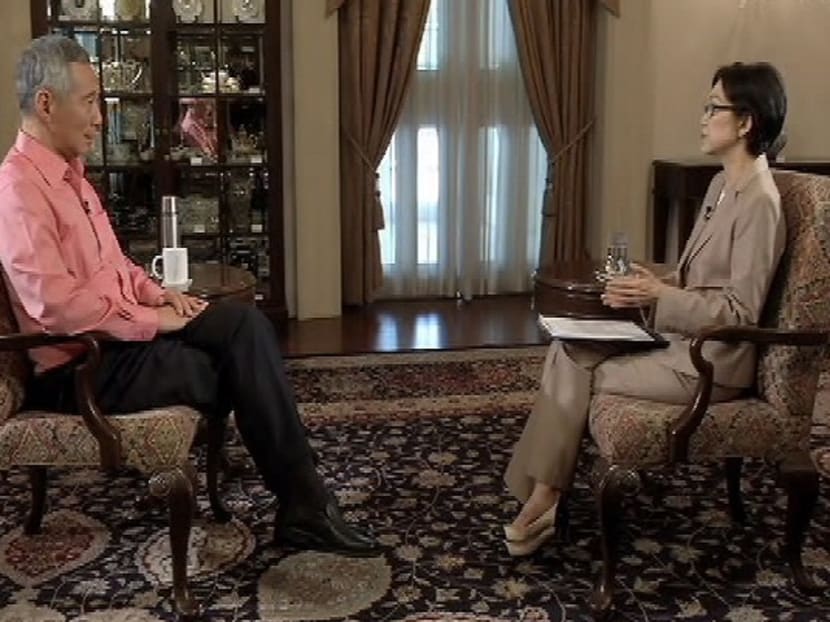Foreigner issue a tough one, but Govt will not avoid it: PM
SINGAPORE – Some four years ago, the inflow of imported labour emerged as one of the hotly debated issues during the 2011 General Election. With the Government having taken decisive steps since even before the elections to curb the numbers of foreign workers, Prime Minister Lee Hsien Loong has reiterated the dilemma facing policymakers in what he described as a “very difficult issue” fraught with trade-offs and long-term implications.

Prime Minister Lee Hsien Loong's interview with Ambassador-At-Large, Professor Chan Heng Chee, was televised tonight (Aug 2). Photo: Channel NewsAsia
SINGAPORE – Some four years ago, the inflow of imported labour emerged as one of the hotly debated issues during the 2011 General Election. With the Government having taken decisive steps since even before the elections to curb the numbers of foreign workers, Prime Minister Lee Hsien Loong has reiterated the dilemma facing policymakers in what he described as a “very difficult issue” fraught with trade-offs and long-term implications.
However, as the Government of the day, it is a decision that he and his team cannot avoid, he said.
“If we were not in the government, it is much easier. We can make recommendations, we can write papers, we can make speeches, and we can rouse arguments, unhappiness, point out all the problems we have where we are standing,” Mr Lee said in an interview with Ambassador-At-Large, Professor Chan Heng Chee, which was televised tonight (Aug 2). “But as a government, we have to deal with this issue and it is an issue where honestly speaking, there are no easy choices.”
The topic of foreign workers came up during the interview where Mr Lee spoke on – for the third time in about five weeks – the challenges that the Republic faces over different time horizons: Economy in the next decade, population in 25 years, and national identity in 50 years. Mr Lee had previously talked about these challenges when he delivered a speech on June 30 at the Ho Rih Hwa Leadership in Asia Public Lecture Series, and in an interview with TIME magazine which was published last month.
Adding that there are trade-offs between economic growth and social pressures, Mr Lee said it is the Government’s job to “think of these issues and to make the best decisions which we can, in our judgment, on your behalf and to account to you, and say to the best of my ability this is what I have decided I have to do”.
“And you may agree with it, you may not agree with it, but I can tell you in complete honesty that I am trying my best to do this on your behalf. And I cannot avoid doing this because otherwise I think I will be letting you down.”
Prof Chan noted that “some people say the Government is being populist when you are now curbing population”.
In response, Mr Lee pointed out that the Government has to “watch to see how the foreign workers and immigrants are fitting in with our community, and you have to watch them mix so that you don’t overbalance the numbers or the tone of our society”. He said: “So it is not populist to take cognizance of these real problems and to deal with them and to calibrate the inflow.”
Apart from any “sentimental reactions or emotional reactions”, the Government also has to look at the overall population size in Singapore. “There is a trade-off in terms of the space and infrastructure, the carrying capacity of this island and we have to decide how far we can go,” he said.
Mr Lee described the balance as “a spot where all things considered, this is something which balances our needs as well as our identity, as well as our economic requirements, and enables us to move forward”. Suggesting that the Government’s policy stance is not permanent, he said: “Then after three, four, five years we look at it again, we revise our view and we adjust our policy.”
Prof Chan noted a view among some that Singapore should curb the inflow of foreign professionals, managers, executives and technicians (PMETs) but continue to let in high numbers of construction workers and foreign domestic workers, for example.
However, Mr Lee pointed out: “From the point of view of a Singapore blue collar worker, he could say, what I want is more PMETs because they will create more employment opportunities for me. I do not want that foreign sweeper or cleaner or nurse to come here and take away my job or push down my pay.”
Mr Lee said: “I think we have to watch to make sure that when we bring in people… we also take care of Singaporeans who may be in that sector and who cannot easily move out of it.”
Prof Chan also asked Mr Lee whether with the curbs on inflow of foreigners, he has won more support from people, compared to “the angst of the PMETs and small and medium enterprises”.
Mr Lee replied: “We have addressed the issue, we have made the difficulties more manageable, there will always be frictions when you have a foreign worker population or immigrant population in the country and we have to manage that.” To that end, both foreigners and Singaporeans have a part to play, Mr Lee added. As far as he was concerned, he would like to “keep this a Singapore-Singapore and that it has to maintain that Singapore character”.






